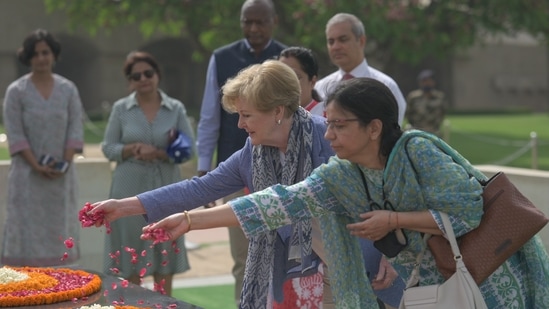India’s role in refugee protection
The article has been authored by Gillian Triggs, an assistant high commissioner for protection with United Nations High Commission for Refugees (UNHCR).
We marked World Refugee Day last month and the right to seek safety. It is a day to both honour the courage and resilience of all those forced to flee, and to remember the generosity of the communities that welcome them, such as the people and Government of India.

This year’s commemoration comes on the heels of a grim milestone. With the ongoing war in Ukraine and the renewed violence and protracted crises in other parts of the world, there are now over 100 million people who have been forced from their homes by conflict, violence and persecution. Close to India, there has been large-scale displacement of people due to conflict in Afghanistan and Myanmar over the past year.
Behind the record-shattering statistics are individual stories of heartbreak: of homes destroyed, families torn apart and dreams of the future dashed. But equally, alongside the scenes of loss and devastation, we have seen the best of humanity: Of communities responding with humanity and solidarity, extending a hand to offer sanctuary to refugees.
Over the decades, India has welcomed refugees, including from Afghanistan, Myanmar, Sri Lanka and other countries. They have found safety and protection and have been included in national health and education systems. Most recently, India’s humanitarian tradition was shown through its humanitarian aid to support neighbouring countries in crisis and its inclusive response to the Covid-19 pandemic, in which refugees were able to access vaccinations on par with nationals.
During my visit to India earlier this year, I was able to see firsthand how inclusive policies and practices could make a difference. In Delhi, I met many motivated refugees, including young students hoping to use the education they received through India’s national system to help others; artists and photographers aiming to share their creativity; and women running small businesses to support their families. If given the opportunity to develop skills and earn livelihoods, refugees can become self-reliant and contribute to the communities in which they live.
It pays dividends when we enable refugees and asylum seekers to access their rights and include them across the spectrum of social and economic life. Efforts towards ensuring the effective inclusion of all refugees and asylum seekers in India’s social security and developmental programmes would contribute to India’s economic growth, developmental priorities and security imperatives.
During my visit to the National Gandhi Museum, I was struck by the common thread one can trace from the spirit of Antyodaya – the concept of trying to uplift the poorest and most deprived groups of people – and the work of UNHCR, the UN Refugee Agency. Rather than seeing people according to their vulnerability, the Charkha symbol shows us how everyone can have a role to play in their community.
Some refugees are without the documentation which would allow them to access socio-economic rights, leaving them dependent on unsustainable assistance. The development of a national asylum system, underpinned by a legal framework, can help to strengthen refugee protection in India by lifting administrative barriers and ensuring access to asylum in an equitable and predictable manner.
This is critical to ensure that refugees and asylum seekers are not left behind and forgotten, but rather can be active, productive members of the local community. Having a legal status and basis to engage in work and the wider community is the best way we can equip refugees for eventual solutions – the ultimate aim for all refugees – including returning home one day.
As UNHCR, we reiterate our call for greater international solidarity and support for refugees and the communities that welcome them. As a leader in the region, India is already playing a vital role in protecting refugees and finding long-term solutions to their displacement, including through its generous support to countries of origin such as Afghanistan and Myanmar.
Together, in the spirit of the Global Compact of Refugees, we must redouble our efforts and cooperation. Together, we can ensure that refugees are able to live in safety and dignity in exile, while working towards the political developments so that they can end their displacement and rebuild their lives.
Everyone has the universal right to seek asylum. Everyone has the right to seek safety whoever they are and wherever they come from.
The article has been authored by Gillian Triggs, an assistant high commissioner for protection with United Nations High Commission for Refugees (UNHCR).



